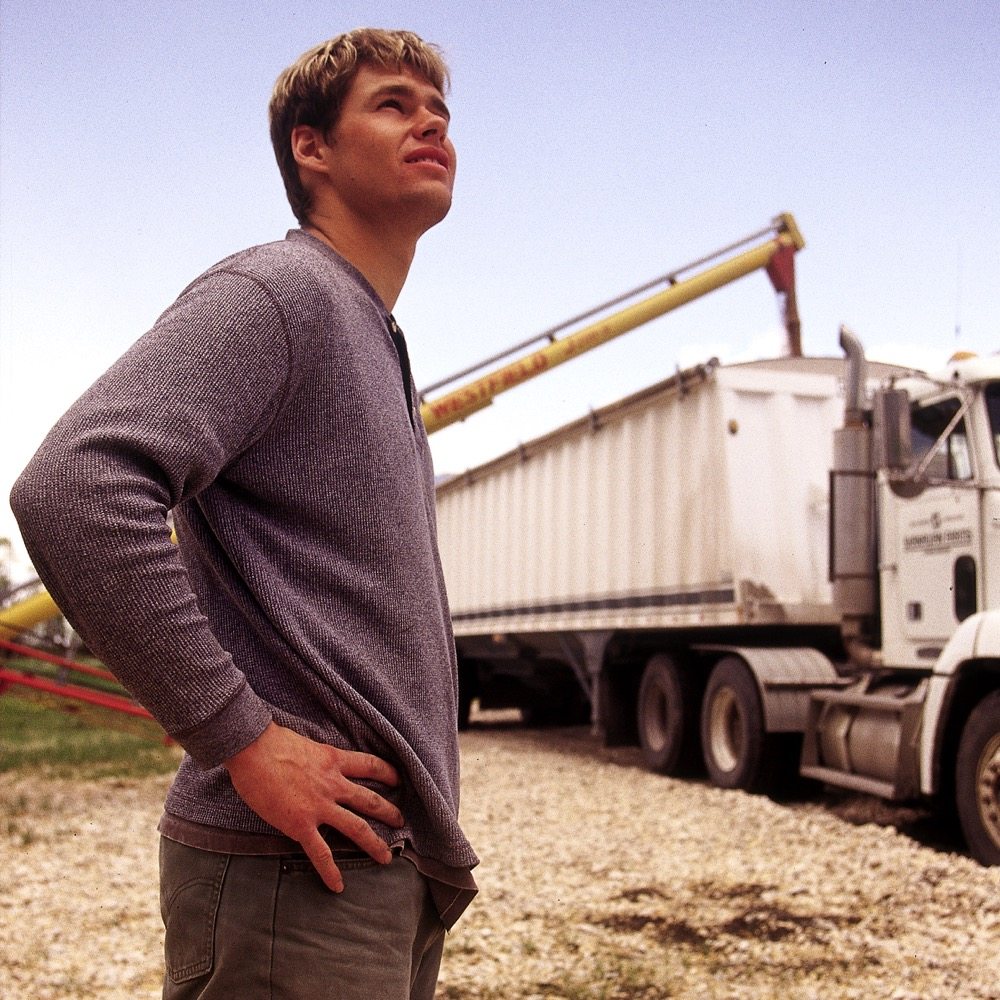If you’re close to retirement, you may be getting ready to succeed the farm to your children. Or, if you’re younger, you’ll be thinking about what is going to happen to the farm when it’s your turn to retire.
In either scenario, your family, your children and the business itself will likely be intermingling, which can sometimes be a complicated process.
Do your younger children have an age appropriate sense that the farm is also a business (i.e. that it’s the family’s livelihood)? Or is the farm just where you happen to call home, and what you keep busy at?
Do your older children know the ins and outs of the how the farm works financially, especially if one or more of them will be succeeding you?
Having your kids understand how money works on the farm is a large part of preparing the ground for a better succession process. And this can start as early as when your children are quite small.
So let’s look into the details of talking to farm children about money.

Jonathan Small, a farm management consultant and family enterprise adviser with MNP, the accounting, tax, and business-consulting firm, works quite a lot with farm families on succession plans. Typically, he says, by the time a family starts seriously working on their succession plan, the successor is often around 30 years old, plus or minus five years.
Even at that age, however, they often lack a good grasp of the financial realities about business, not to mention the financial specifics about the farm they’re about to buy or be given, Small says.
It’s a gap that can make it tough for parents and children to get on the same page.
Not every succession plan goes well, Small has found. And, he adds, “A lack of education and a lack of experience financially has been one of the single biggest barriers to completing those successions.”
Read Also

Five reasons why you avoid farm bookkeeping
Bookkeeping for the farm business might not be anyone’s favourite chore, but staying on top of it can help your farm access the funds it needs to grow.
Usually these successors are highly competent in every other way, he adds. They have a good work ethic. They know how to farm.
It’s just that they aren’t interested in finance.
Getting started
There may be a variety of reasons why parents don’t discuss the farm finances with their kids. They may want to protect the children, they may want to keep certain things private, or maybe they just aren’t sure how to go about teaching the children about the business.
When that younger child grows up without having learned about the business or money side of the farm, though, this paves the way for a troubled succession.
“Suddenly, the process starts to slow down because Mom and Dad don’t think they’re ready, and they can’t put their finger on why, but finances are often at the root of it,” says Small. The successor has “never seen the financial statements. They’ve never met with the accountant. They spend money like it’s water.”
It’s a big problem, especially if you’re hoping to retire and pass the farm down sooner rather than later.
So, how do you nip that problem in the bud?
“Your succession plan begins before your kids even go to school, think about it like that,” says Small. This doesn’t mean you open the books to them when they’re too young for it — it is mostly strategic at this point, more about the bigger picture than exact dollars and cents.
And it doesn’t mean your children will definitely become farmers, so just keep in mind that it’s good for the kids to know about money whether or not they end up in farming. Maybe they’ll go into business in other sectors, or maybe they’ll be better employees because of their financial appreciation.
What can you teach?
Parents may not realize how much they’ve had to learn, or how little the children can be expected to know. For parents, thinking about business has become so automatic, it’s like muscle memory, Small says, and they can work the finances “without really thinking about it.”
Now parents have to become teachers, which can be difficult if that’s not your natural way of being or doing.
Just keep your eye on the big picture, Small recommends. “It’s very positive for small kids to be raised understanding that we live and grow up and work in a family business… The farm is something to enjoy but it is also a business and we have to be business-like sometimes.”
“There’s no harm in having your seven-year-old there when you meet the fertilizer rep or the banker. They’ll probably be bored, they’ll wonder what it is all about, but kids at that age are sponges. They learn so much from the non-verbal. So how you conduct yourself in a business environment has a huge influence on them later on,” says Small.
Thinking of it this way can help your future succession plans because kids don’t just learn the actual farming process — which is often the more engaging and fun part — but they learn the business side too, and there are some stakes involved.
As kids grow, teaching them about income and expenses is important, says Small. If your child’s 4-H animal gets sold, that can be a teaching moment — maybe you put something in a college fund. There’s income there, but there are also expenses.
Expenses often become “Mom and Dad’s problem” in this kind of scenario, says Small, and that might be missing an opportunity for learning. “I’m not saying that’s a bad thing… let’s make it a bit more real.”
Rent them some land
Small says it is quite rare that he sees parents who have shown younger kids the appropriate parts of the financial picture.
But it doesn’t have to be that difficult.
As your children grow up, the ones who stay on the farm can get a great sense of how the farm works as a business if they start working their own plots, perhaps with Mom and Dad acting as a bit of a cushion.
“Some of the most capable successors are the ones who, by the time I meet them in their late-20s, actually have been encouraged to rent their own land or even rent land off Mom and Dad to farm it,” says Small.
The 20-something pays rent, they may repay a loan to Mom and Dad (it’s important the parents expect to be repaid), and they learn the highs and lows of a business.
Parents can be a safety net here, but it is a way to have your possible successor understand the depth of the farming business, not be thrown in cold. In this kind of scenario, the adult child has had to cut cheques to pay bills. “And sometimes,” says Small, “their bills are bigger than their crop.”
But such a loss can be a good thing if it throws some realism into the mix. The adult child has to “do their own bookkeeping, open their own bank account and manage their finances.” Parents can still give advice, but having the kids learn hands-on, says Small, is often better than being told or shown the way.
If you’re getting closer to working a succession plan soon, and haven’t involved the older kids in the finances yet and aren’t quite sure if a successor can quite handle everything, you can think about implementing a trial period of sorts, says Small, especially if the scenario is a child coming back to the farm after a period of working somewhere else.
This shouldn’t be an “open-ended” period of time, though, and there should be clear objectives in place.
What does the adult child need to learn? Oftentimes, it is the financial picture. For this process to work, at this later stage, there will need to be “expectations on both sides,” says Small. Mom and Dad will have to teach, and the adult child will need some incentive and ability to start taking some control.
In summary, whether your kids are still young, teens, or adult children, money needs to be a discussion on the table, if you want them to succeed you.















